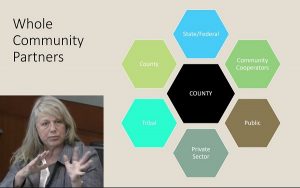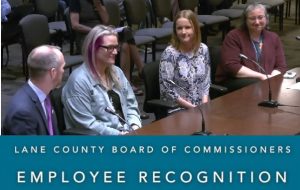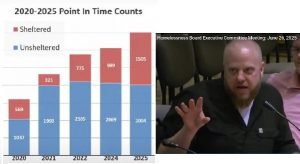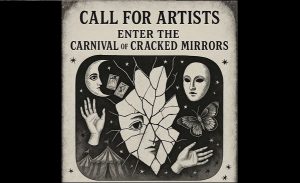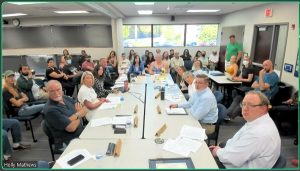Rewind with Todd Boyle: March Against Fear
7 min read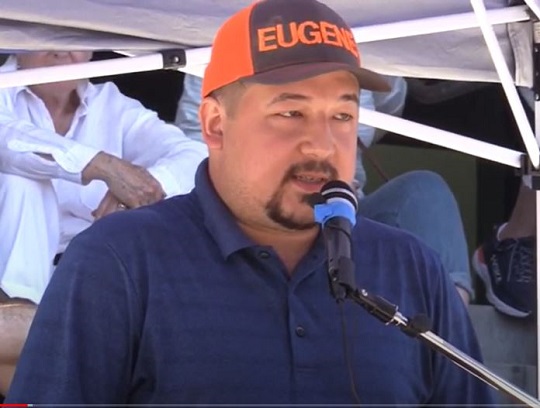
Todd Boyle: The following is a report on the March Against Fear that took place on Sunday, June 20. There was a coalition of organizations that organized this march and talks against gun violence and principally the NAACP and Moms Demand Action. The event began with four talks from interfaith groups at Monroe Park, and it continued with a march with a couple hundred people who marched to the federal courthouse.
[00:00:48] And there we heard more than 10 speeches totaling more than an hour, and so I’m going to present some segments out of these talks. The first speaker is Miles Pendleton, the branch president of Springfield Eugene NAACP. and he’s going to describe the orientation of this event.
[00:01:07] Miles Pendleton: So I won’t stand on stage too much longer before, but the principle of this march is March Against Fear. It’s a march against violence. It’s a march against terror. It’s a march against domestic terrorism. It’s a response, a community-wide response, and hopefully a catalyst. Following and in the aftermath of all these recent acts of gun violence that we’ve seen proliferate our nation for the last 20, some odd years, attacked all sorts of different people, specifically our most vulnerable and minoritized groups.
[00:01:34] And so today we’re standing against fear because we understand this violence to be domestic terrorism it’s hope is to stoke fear. It’s hope is to stoke a fear that creates stagnation that creates inaction for, for, for fear of what recourse might be taken.
[00:01:50] Amelia: Hello, everybody. Can everyone hear me? My name is Amelia.
[00:01:57] I’m an incoming freshman at South Eugene High School, and I am here to fight alongside all of you to show the government that we are done, pretending like guns aren’t still killing people. Right? (Done! Done!)
[00:02:13] This week has reminded us more than ever that we are living in a country that where guns have more rights than women. The overturning of Roe v. Wade two days ago made it abundantly clear that our government does not care about the lives of children, teens, and women. They just want to be in control. I want to spotlight the fact that these laws made by a majority of old, straight white Christian men, disproportionately impacts black and indigenous people, women, LGBTQ+ members and schoolchildren.
[00:02:45] The Pulse nightclub shooting was a hate crime against people for just loving who they love. The Buffalo shooting was only a couple weeks ago, killing innocent shoppers, just because they were black. Domestic violence happens against women daily, leaving women scarred and shielded, if not dead kids every day, fear about just walking into a school classroom because of the environment the government has created.
[00:03:12] I feel as adults, I feel as if the adults in charge do not care about us, they just want control. Let’s look at the statistics. 62% of the deaths by gun violence in the us are suffered by African Americans. Gun safety is racial justice.
[00:03:34] I am 13 years old, which means I am not supposed to die anytime soon. yet. What if I were to die? It probably wouldn’t be from a car crash, even though I ride in a car every single day. It wouldn’t be from COVID 19. No, it wouldn’t be from any of those. I would be most likely to die from a gun. Yes, that’s right.
[00:03:54] The most likely way for 13 year old teenager to die is from an incident with a firearm. I don’t know how to not feel scared anymore. I think that’s why I’m here today. Speaking to all of you. Okay. That’s my way to deal with fear, to fight racism, homophobia, misogyny, and try to make a difference to try to change the laws.
[00:04:15] So black people, native American, LGBTQ+ people and women and people who identify across all these groups can feel dignity, safety in their homes, schools, and communities.
[00:04:30] Piper: Okay. I’ll just hold it. Hello. I’m Piper. I’m a local activist. Pushing for gun reform. And I feel, I need to tell you about how gun laws in America are affecting me and my friends.
[00:04:46] I’m going into high school and I have four more years until I can vote, but the adults can please please commit to keeping us safe. Our country needs to do something about the ongoing epidemic of gun violence that plagues our schools, places of worship supermarket. Concerts in any other public place where mass shootings have happened in our country.
[00:05:11] On your 18th birthday, you can buy cough medicine, spray paint, and a deadly gun. Only one of those things have caused over 2020 1000 deaths and counting so far in 2022, obviously drills are not the solution laws are. Yeah. Amen.
[00:05:34] Surely our one country can make laws limiting civilian access to military weapons. Yeah. Good to me. This is common sense. Yeah. Yeah. Senators, our blood is on your hands. Yeah. It’s your move. And there’s only one right option. Let’s make action happen. Thank you all for coming up.
[00:06:00] Rachel Beckley Rich: Hi, my name is Rachel Beckley Rich. I’m here today to tell you about how shootings affect individuals and communities. This is my story as a teacher who by default became a first responder at the Thurston shooting in 1998 at my school. It was a beautiful sunny morning. And we were holding a special breakfast in the library for seniors who were receiving honors or simply just, we were celebrating them.
[00:06:38] And I left with such a feeling of hope and pride in these young men. And suddenly one of my colleagues brought in a student that was dripping blood from his arm and he said, ‘Please hold his arm. His artery is ruptured. There’s a shooting in the cafeteria.’ And of course my heart pounded. Within moments though, approximately a dozen wounded students came rushing in expecting the nurse to be there briefly.
[00:07:15] I was the only adult in that room. And so I started setting up a triage. I recognized what kinds of wounds those were. I was assessing wounds, reassuring students, lying through my teeth, doing my best to figure out who was seriously wounded and who was just going to be okay. I put them in the back.
[00:07:43] There were wounded students lying everywhere if they had not already been taken by, um, a. And by the way, I’m telling you the cleaned up version, such a loss of peace and innocence takes years to heal. How can we stop this madness? Please formally join a gun safety organization like these: Moms Demand Action, March For Our Lives, Ceasefire Oregon, or Gun Owners for Responsible Ownership.
[00:08:21] Precisely because of people like you joining us, we were able to stand up to the gun lobby and help pass the first major gun legislation in 30 years, the bipartisan Safer Communities Act focuses on red flag laws, mental health services, and closing the boyfriend loop.
[00:08:47] Kennah: I’m just going to get right into it. My name is Kennah. I was born and raised right here locally in Springfield, graduated from Thurston High School. I now attend the University of Oregon with a major in Crime, Law, and Society and a minor in Legal Studies. As someone who enjoys studying sociology. I’m very interested in intersecting information and patterns.
[00:09:09] Some of the intersections I want to discuss today is the Black community, gun violence and criminalization. Gun homicides, assaults, and police shootings are disproportionately prevalent in historically-underfunded neighborhoods and cities. This lack of funding intensifies our country’s longstanding racial inequities.
[00:09:30] Due to a combination of racist real estate policies and practices such as redlining, restrictive covenants, more covert racism, and policy that followed from the 1930s to the 1970s and differing opinions on segregation, these same underfunded cities, lacking resources for people to be able to thrive are also predominantly Black.
[00:09:53] When it comes to owning homes, receiving a high quality education, being subject to police interaction, having access to outdoor activities, and even experiencing gun violence, black people were and are systemically ostracized. Us Americans have a 25 percent higher chance of being murdered by gun violence than people in other high-income countries.
[00:10:19] Now there’s one statistic that I want to throw at you that actually surprised me. I want you to think of the scariest neighborhood that you can. Somewhere unsafe to walk alone at night, somewhere where you can’t trust anyone somewhere where there’s a bunch of abandoned buildings, somewhere plagued by violence.
[00:10:38] You might think of somewhere in Portland, somewhere in Chicago, Detroit, Compton. I’d like to share an expert from There’s No Such Thing As A Dangerous Neighborhood by Steven Lurry, a piece I read in a class called Deviance, Crime and Control. Dispelling the notion of dangerous neighborhoods, extensive research on geographic concentration has consistently found that around half of all crime complaints or incidents of gun violence concentrated at about five percent of street segments or blocks in a given city.
[00:11:11] Moving past violent communities, sophisticated analysis of social networks have demonstrated that homicides and shootings are strongly condensed within small social networks. Within. And that there are even further concentration of violence within these social networks. It’s time to focus on the real issues: the prevalence of guns, unaffordable physical and mental healthcare, inequitable education, and just general inequality.
[00:11:41] When is enough enough? How many devastating incidents did there have to be for people to see the problem with gun violence, to be willing, to make it harder to own a killing machine? For the sake of our children, when will we ban assault weapons designed to take away life quicker and more efficiently?
[00:12:02] When will we stop refusing to be more open to flexibility with a document drafted over 200 years ago by old racist white men?
[00:12:14] Please don’t stop fighting for stricter gun laws for less police presence, funding education, mental health services, and thinking about systemic reform.
[00:12:28] Todd Boyle: Since there were more than 10 speakers and more than an hour of talk, it wasn’t possible to include all these talks.
[00:12:35] And so I encourage everyone to go and watch the video on YouTube. And it is at youtube.com/ToddBoyle. Thank you.
